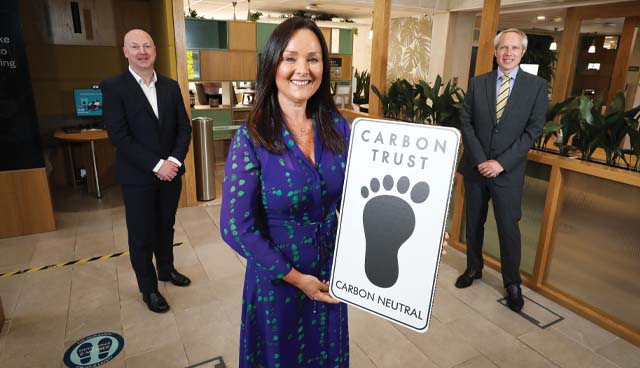Building back responsibly

With the economy showing positive signs of recovery from the coronavirus pandemic, Aisling Press, Managing Director of Personal Banking at Danske Bank, says the bank has a continuing role to play as a force for good in society in Northern Ireland.
Danske Bank’s activities over the past number of months have been based around a strategy to help Northern Ireland grow again, a strategy which recognised that the turbulence caused by the pandemic would not hold people and businesses back from making key investment decisions forever, but that after a period of such uncertainty, they would need support to move forward.
In March, the bank announced the creation of a £500 million business growth fund for medium to large business, which followed a new campaign to support small businesses and were one of the first to market in reintroducing 95 per cent loan to value mortgages, to help boost the housing market.
“At a time when there is so much volatility in the economy and in our sector, we have tried to demonstrate that we are here to serve the people of Northern Ireland,” says Press.
“We are optimistic about the outlook and committed to playing a key role in economic recovery. It is about building back responsibly, supporting our customers, society and our own people too.”
As in many industries, the bank has seen existing customer trends accelerate during Covid-19. The bank has announced plans to close four branches in October, but has also invested over £5.5 million into transformational upgrades of 19 branches in the past five years.
“We shape our business around customer behaviour and many people now prefer to bank with us, online, though our banking apps or by phone. But branches remain a key channel for us and we will still have a large physical presence. We have had to make tough decisions on small locations that are not being used, but we have responded by investing where customer activity demonstrates need,” explains Press.
“We’re investing in more branch refurbishments before the end of this year and into next year, upgrading technology and enhancing functionality so that customers can do what they want more quickly, either on their own or with the help of a colleague,” says Press.
There is no doubt that the trend towards digital banking has accelerated, in part driven by shops and services asking people to pay by card rather than cash under Covid-19 health restrictions. In the year to the end of May, Danske Bank saw customer card use rise 30 per cent, contactless payments rise 72 per cent and payments from wearable technology up 228 per cent. Use of its own mobile app increased nearly 10 per cent from already high levels.
“The industry is going increasingly digital as customer habits change, so we are bringing in more digital services and solutions. But we are a local bank, so we focus on delivering those digital solutions with a human touch. We are not trying to be like a Starling or Monzo because we know people in Northern Ireland value having a human contact to talk to, particularly when they have a problem or complex financial needs,” says the Managing Director of Personal Banking.
As an example, Aisling cites the investment in technology to enable customers to connect with personal bankers by video meetings, an alternative way to manage the banking needs of those who are unable to visit their nearest branch and a Covid-safe option for those who still want to meet in a branch. Half of all personal banking customer meetings now take place by video.
The drive to enable digital banking while retaining a human touch has also led to major investment in Danske Bank’s award-winning customer contact centre, based just outside Belfast and accessible seven days a week. Calls to the contact centre went up over 30 per cent at the start of the pandemic and remain 10 per cent above pre-pandemic levels today.
Staff at the contact centre have been the first point of contact for everything from loan and mortgage payment holiday applications to business Bounce Back Loan applications and handling fraud reports.
“The fact that our contact centre is local is a big selling point for our customers; it is important to them. It is the same reason we have a local private banking team, a locally-based mortgage team and a team of community bankers who are out interacting with customers,” explains Press.

“Our branches and contact centre have been brilliant at helping the increasing number of customers in vulnerable circumstances. There are so many stories of being able to help customers and in many cases connecting them with charities or other organisations that can help, such as Age NI, AWARE, Hourglass, GamCare and many others.”
Building on its previous position as NI Responsible Company of the Year, Danske has continued to focus on tackling major societal issues such as digital inclusion, mental health, diversity and inclusion and many others. It does so through high levels of colleague engagement and a strong partnership approach, working with Business in the Community, its charity partner, AWARE NI, and many other organisations to help make a difference.
“While our focus has been on supporting our customers and colleagues through the pandemic, we have also been working on new initiatives, such as developing a workplace domestic abuse policy, launching a race equality network, introducing a card blocking option for customers wanting to address their gambling spend, adapting our financial education programme in schools to be able to deliver that virtually, donating laptops to schools, and many more,” explains Press.
But it is helping to tackling climate change and sustainability where Danske Bank sees its key role. For many years, Danske has led the way in its sector on minimising the environmental impact of its own operations, and while there is more to be done, the bank is also focusing on helping customers become more sustainable.
In June 2021, Danske Bank launched the UK’s first Carbon Trust-certified carbon neutral mortgage, available at its most competitive rates to people in homes with an A–C energy efficiency rating, a significant first step in this journey.
All of this has contributed to the bank being ranked by Best Companies as the 10th best company to work for in Northern Ireland and 21st in the financial services sector UK-wide.
“It is all woven into who we are as a company,” states Press. “We are in the business of helping companies, families and individuals achieve their ambitions and ensuring we do this in a sustainable and responsible way is at the heart of our business.”
W: www.danskebank.co.uk






